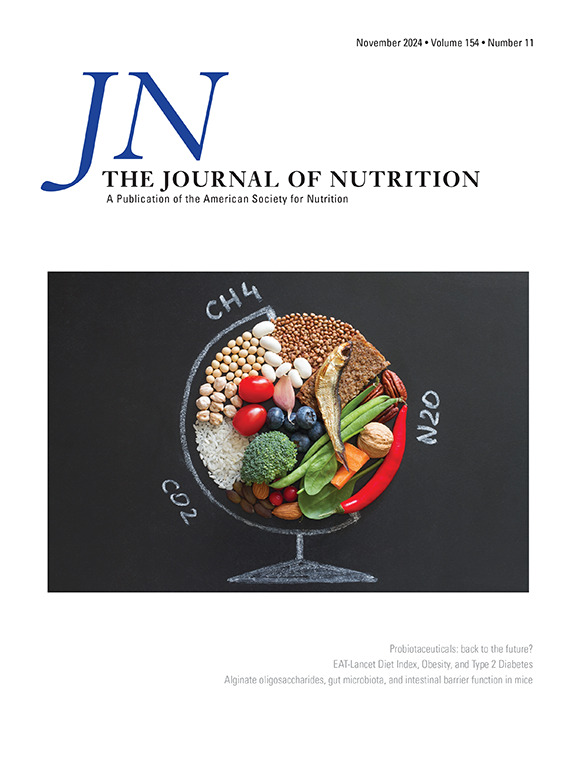Predicting Cognitive Outcome Through Nutrition and Health Markers Using Supervised Machine Learning
IF 3.7
3区 医学
Q2 NUTRITION & DIETETICS
引用次数: 0
Abstract
Background
Machine learning (ML) use in health research is growing, yet its application to predict cognitive outcomes using diverse health indicators is underinvestigated.
Objectives
We used ML models to predict cognitive performance based on a set of health and behavioral factors, aiming to identify key contributors to cognitive function for insights into potential personalized interventions.
Methods
Data from 374 adults aged 19–82 y (227 females) were used to develop ML models predicting cognitive performance (reaction time in milliseconds) on a modified Eriksen flanker task. Features included demographics, anthropometric measures, dietary indices (Healthy Eating Index, Dietary Approaches to Stop Hypertension, Mediterranean, and Mediterranean–Dietary Approaches to Stop Hypertension Intervention for Neurodegenerative Delay), self-reported physical activity, and systolic and diastolic blood pressures. The data set was split (80:20) for training and testing. Predictive models (decision trees, random forest, AdaBoost, XGBoost, gradient boosting, linear, ridge, and lasso regression) were used with hyperparameter tuning and crossvalidation. Feature importance was calculated using permutation importance, whereas performance using mean absolute error (MAE) and mean squared error.
Results
Random forest regressor exhibited the best performance, with the lowest MAE (training: 0.66 ms; testing: 0.78 ms) and mean squared error (training: 0.70 ms2; testing: 1.05 ms2). Age was the most significant feature (score: 0.208), followed by diastolic blood pressure (0.169), BMI (0.079), systolic blood pressure (0.069), and Healthy Eating Index (0.048). Ethnicity (0.005) and sex (0.003) had minimal predictive effect.
Conclusions
Age, blood pressure, and BMI show strong associations with cognitive performance, whereas diet quality has a subtler effect. These findings highlight the potential of ML models for developing personalized interventions and preventive strategies for cognitive decline.
使用监督机器学习通过营养和健康标记预测认知结果。
背景:机器学习(ML)在健康研究中的应用正在增长,但其在使用不同健康指标预测认知结果方面的应用尚未得到充分研究。目的:我们利用机器学习模型来预测基于一系列健康和行为因素的认知表现,旨在确定影响认知功能的关键因素,从而深入了解潜在的个性化干预措施。方法:使用374名年龄在19-82岁的成年人(227名女性)的数据,开发预测改进的Eriksen flanker任务的认知表现(以毫秒为单位的反应时间[ms])的ML模型。特征包括人口统计学、人体测量、饮食指数(健康饮食指数[HEI]、饮食方法来停止高血压[DASH]、地中海和地中海-DASH干预神经退行性延迟[MIND])、自我报告的身体活动、收缩压(SBP)和舒张压(DBP)。数据集被分割(80:20)用于训练和测试。预测模型(决策树,随机森林,AdaBoost, XGBoost,梯度增强,线性,Ridge和Lasso回归)使用超参数调整和交叉验证。特征重要性使用排列重要性计算,性能使用平均绝对误差(MAE)和均方误差(MSE)计算。结果:随机森林回归器表现最好,MAE (ms)最低(训练:0.66,检验:0.78),MSE (ms2)最低(训练:0.70,检验:1.05)。年龄是最显著的特征(得分:0.208),其次是DBP(0.169)、BMI(0.079)、SBP(0.069)和HEI(0.048)。种族(0.005)和性别(0.003)的预测作用最小。结论:年龄、血压和身体质量指数与认知能力密切相关,而饮食质量的影响则较为微妙。这些发现突出了ML模型在开发个性化干预和预防认知衰退策略方面的潜力。
本文章由计算机程序翻译,如有差异,请以英文原文为准。
求助全文
约1分钟内获得全文
求助全文
来源期刊

Journal of Nutrition
医学-营养学
CiteScore
7.60
自引率
4.80%
发文量
260
审稿时长
39 days
期刊介绍:
The Journal of Nutrition (JN/J Nutr) publishes peer-reviewed original research papers covering all aspects of experimental nutrition in humans and other animal species; special articles such as reviews and biographies of prominent nutrition scientists; and issues, opinions, and commentaries on controversial issues in nutrition. Supplements are frequently published to provide extended discussion of topics of special interest.
 求助内容:
求助内容: 应助结果提醒方式:
应助结果提醒方式:


